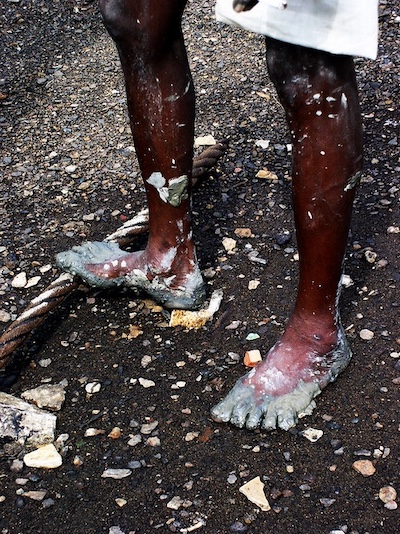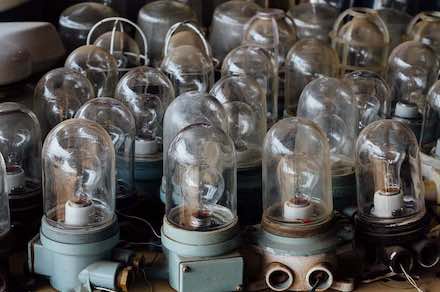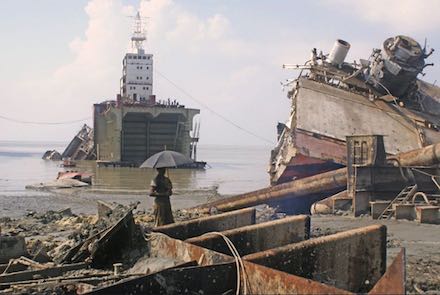
|
|
|
|
|
| Issue 18: | 29 Apr. 2023 |
| Poem: | 220 words |
| Author’s Note: | 246 words |
By Lori Howe
nautical twilight
—for Patrick

Barefoot Shipbreaker, Bangladesh (2005)
Copyrighted © by Adam Cohn1
nautical twilight
is a great ship, vast enough to hold a whole city, driven onto the beach, wind and water invited to peel back its whale-skin, while the ship-breakers wrap bread for the journey, packing axes and hammers as their wives pray against storms, against fire and falling bodies. If they have a thousand days together, man and ship join in a taut braille of blood and iron, salt languages, historical memory. In Gujarat, India, a thousand miles of coastline, and here, near Alang town, the lower bodies of ships rise and curve; great, mythological hulks to be stripped of their strength, watching their own smooth, white hulls calve away, a hundred feet and thirty years into the tide. A line of jewel-colored buoys stretches from ship to land, becomes men in bright shirts, chest-deep in foam, arms above their heads, carrying stacks of sheets, trays of teacups, nautical charts, enormous white signs: SAFETY FIRST SMOKING AREA LIFE BOATS Every detached molecule of the great ships a fresh ballast for the six-mile market of broken findings, where even old lightbulbs and ropes fetch a high price, stained as they are with the tea memory of long voyages, of high seas and the dark romance of human bodies so far from solid land, in the darkling realm of monsters.

Salvage Lighting from Ships, Alang, India (2015)
Copyrighted © by Adam Cohn2
Author’s Note
Ship-breaking, the process by which large cargo and other ships that have reached the end of their seafaring lives are broken down and recycled, has a dark history of pollution, dangerous working conditions, and an unacceptably high death toll for unprotected laborers, who have few rights and are often migrant workers. In 2016, the EU (European Union) passed laws requiring the ships of all EU countries to be recycled more safely and according to protocols that protect the environment and the lives and health of workers, in approved facilities.
Unfortunately, with an eye on profit, many shipping companies are finding loopholes and sending more ships to South Asia, where several nations continue to allow the old methods of ship-breaking, which often include little more than a workforce of men with sledgehammers, many of whom will die or be seriously injured in the process of breaking down a ship. The international community is making serious attempts to regulate this industry, but the path ahead will be long and very likely still littered with human bodies.
“From 31 December 2018, EU-flagged commercial vessels above 500 GT must be recycled in safe and environmentally sound ship recycling facilities that are included on the European List of approved ship recycling facilities. The List was first established on 19 December 2016 and is periodically updated to add additional compliant facilities, or, alternatively, to remove facilities which have ceased to comply. The List comprises facilities operating globally” (NGO Shipbreaking Platform).

Shipbreaking, Sitalpur, Bangladesh (2009)
Copyrighted © by Lindsay Bremner3
Publisher’s Notes:
Ms. Howe’s poem was inspired in part by Wim Van Cappellen’s striking photographs of workers dwarfed against the backdrop of a gargantuan tanker at Chittagong Ship Graveyard in 1996.
For more about Alang’s shipbreaking industry, see the unforgettable documentary film Shipbreakers (73 minutes), National Film Board, Canada (2004): “As visually mesmerizing as it is compelling, Shipbreakers takes the viewer into the heart of Alang, India, a vibrant shantytown where 40,000 people live and work in the most primitive conditions.”
Links below were retrieved on 26 April 2023:
- The photograph Barefoot Shipbreaker, Bangladesh was shot by Adam Cohn on 18 December 2015 and is reproduced here from the Shipbreaking group on Flickr:
https://www.flickr.com/photos/adamcohn/4114569548/in/pool-shipbreaking/
Image appears above under Creative Commons Public License, Attribution-NonCommercial-NoDerivatives 4.0 International (CC BY-NC-ND 4.0):
https://creativecommons.org/licenses/by-nc-nd/4.0/legalcode - The photograph Salvage Lighting from Ships, Alang, India was shot by Adam Cohn on 18 February 2015 and is reproduced here from the Shipbreaking group on Flickr:
https://www.flickr.com/photos/adamcohn/21062439625/in/pool-shipbreaking/
Image appears above under Creative Commons Public License, Attribution-NonCommercial-NoDerivatives 4.0 International (CC BY-NC-ND 4.0):
https://creativecommons.org/licenses/by-nc-nd/4.0/legalcode - The photograph Shipbreaking, Sitalpur, Bangladesh was shot by Lindsay Bremner in November 2009 and is reproduced here from her Shipbreaking album on Flickr:
https://www.flickr.com/photos/lindsay_bremner/4207905229/in/album-72157623055950856/
Image appears above under Creative Commons Public License, Attribution 4.0 International (CC BY 4.0):
https://creativecommons.org/licenses/by/4.0/legalcode
Lori Howe
is a co-creator of the new poetic form, the cadralor [plural: cadralore], and Editor in Chief of its flagship journal, Gleam. Her work appears in such journals as The Meadow, The Tampa Review, Sandstorm, Verse-Virtual, Synkroniciti, and MacQueen’s Quinterly. She is also the author of Cloudshade: Poems of the High Plains and Voices at Twilight (Sastrugi Press, 2015 and 2016 respectively) and the editor of Blood, Water, Wind, and Stone: An Anthology of Wyoming Writers (Sastrugi Press, 2016).
Ms. Howe lives and writes in Laramie, Wyoming, where she is a professor in the Honors College at the University of Wyoming, and mother to a feral cat named Miss Kitty Pants.
More on the Web: By, About, and Beyond
⚡ An Incomplete List of All Exotic States of Matter and Opals and Other Edible Jewels, two cadralore by Lori Howe in Issue 17 of MacQ (29 January 2023)
⚡ Magnetoreception, a cadralor by Lori Howe in MacQueen’s Quinterly (Issue 13, May 2022), nominated by MacQ for the Pushcart Prize
⚡ Refraction and Ripening, two cadralore by Lori Howe in MacQ (Issue 6, January 2021)
⚡ New Poetic Form With Wyoming Roots Goes Viral by Micah Schweizer at Wyoming Public Media (4 December 2020); includes audio of Lori Howe reading her cadralore (Numbers 9, 5, and 4)
| Copyright © 2019-2025 by MacQueen’s Quinterly and by those whose works appear here. | |
| Logo and website designed and built by Clare MacQueen; copyrighted © 2019-2025. | |
|
Data collection, storage, assimilation, or interpretation of this publication, in whole or in part, for the purpose of AI training are expressly forbidden, no exceptions. |
At MacQ, we take your privacy seriously. We do not collect, sell, rent, or exchange your name and email address, or any other information about you, to third parties for marketing purposes. When you contact us, we will use your name and email address only in order to respond to your questions, comments, etc.